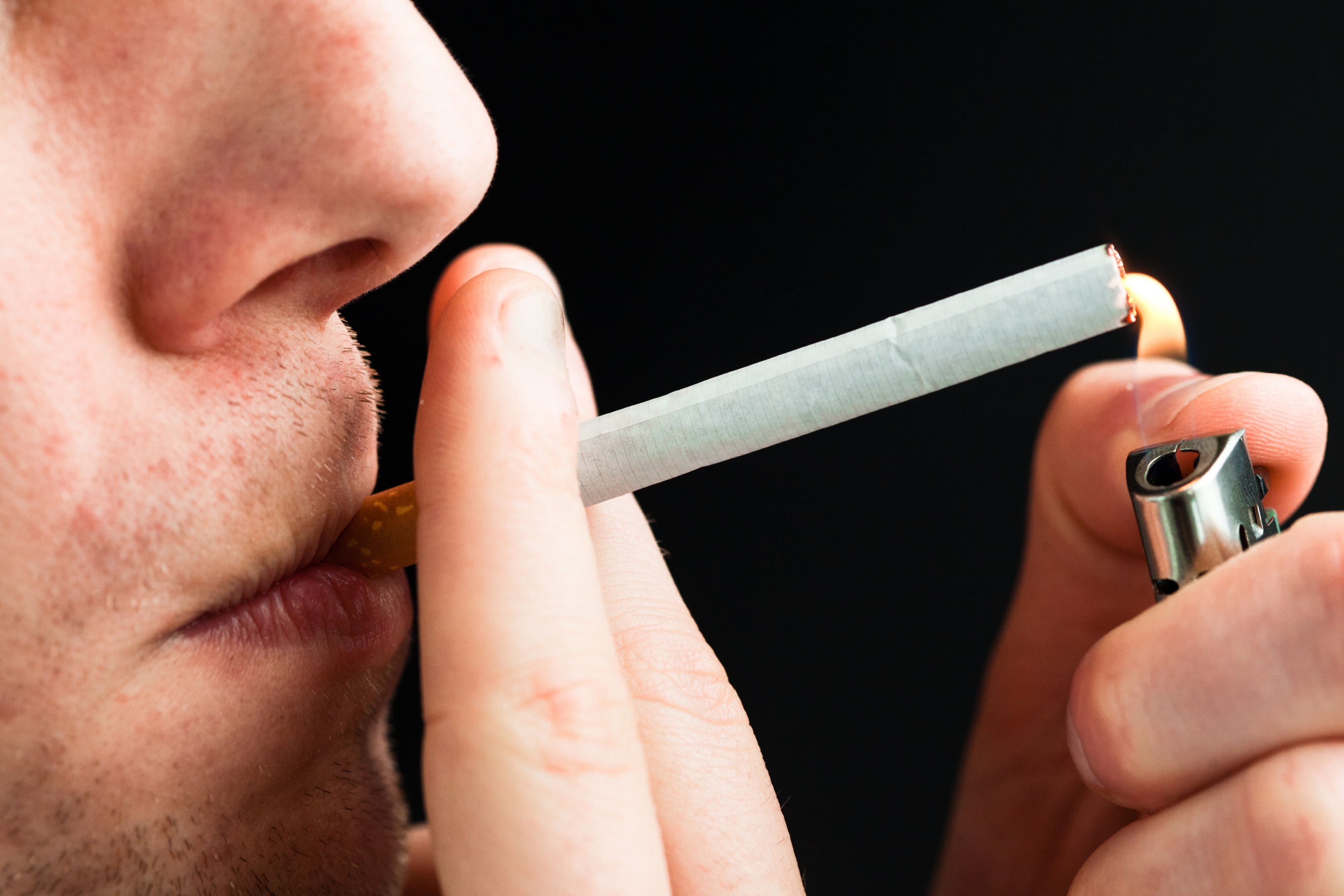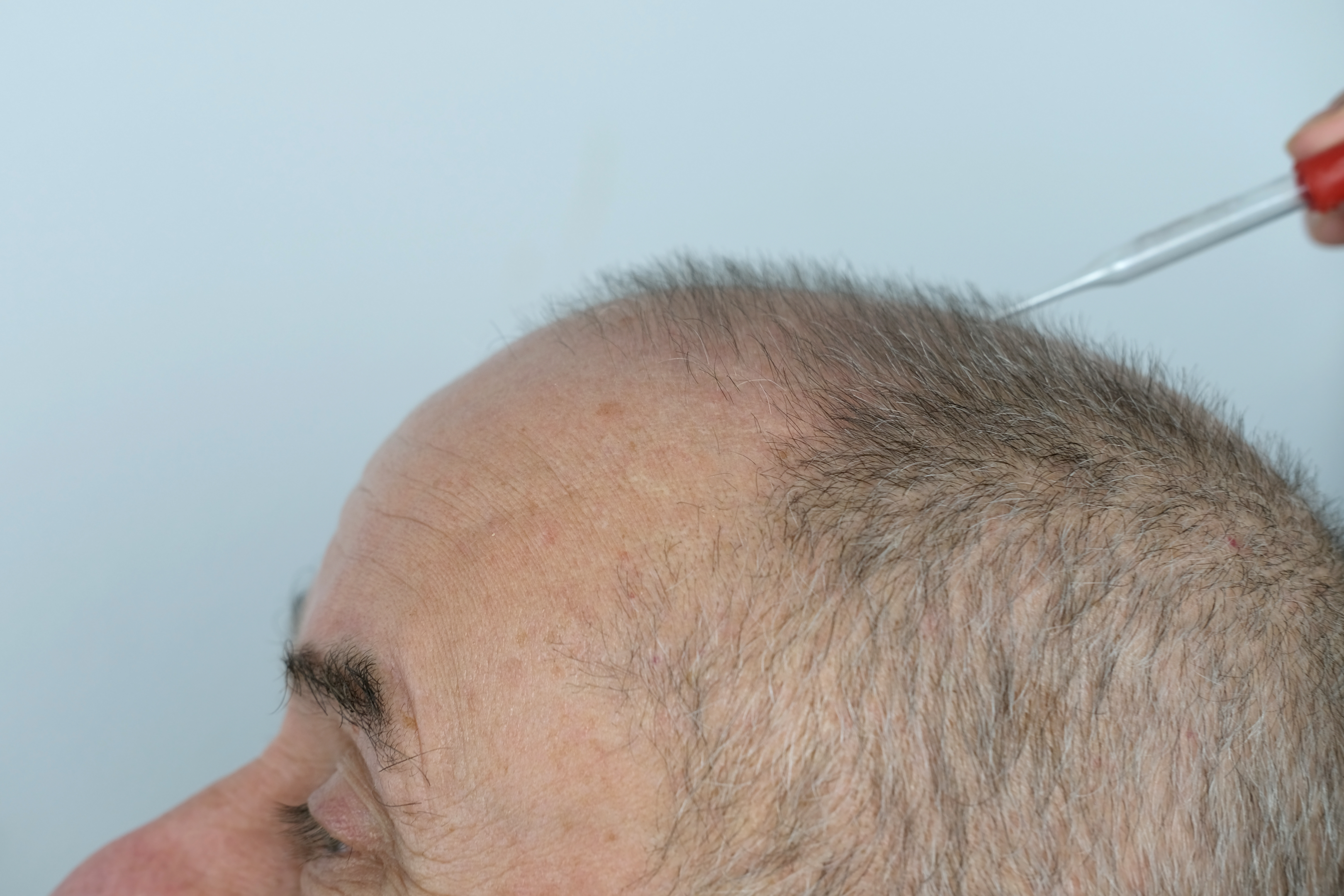Does Smoking Cause Hair Loss?
There have been several studies looking into the relationship between cigarette smoking and hair health.
One large 2021 review looked at several studies assessing hair health in smokers and found an association: those who smoked cigarettes appeared to suffer more with hair loss. The link was even stronger in people with androgenetic alopecia (AGA), otherwise known as male pattern baldness (MPB).
One 2017 study looking at the impact of smoking on MPB found that those who smoked more than ten cigarettes a day had three times the risk of moderate-to-severe MPB. MPB has a big genetic component to it, so the effects of cigarette smoke may take a firmer hold in people with a genetic susceptibility to hair loss.
Another 2020 study looked at the effect of smoking on early-onset MPB. They assessed one thousand males aged 20-35, with five hundred in the smokers’ group and five hundred in the non-smokers’ group.
They found that a massive 85% of the smoker’s group had more than double the risk of MPB, compared to the non-smokers. Even worse, nearly half of the smokers’ group had grade III MPB (defined by thinning hair at the top of the scalp) and a quarter had grade IV MPB (very noticeable hair loss), compared to just 10% of the non-smokers.
So there seems to be a link between cigarette smoking and hair loss- particularly in those with a susceptibility to genetic hair loss, such as with MPB.

How does smoking cause hair loss?
We’re all in the pursuit of healthy hair, but with chemicals like nicotine, tar, and carbon monoxide entering your bloodstream with every puff, it’s no surprise that smoking cigarettes can contribute to hair loss. Below are the main mechanisms, which not only affect hair health but also impact overall health.
Reduced blood flow
Smoking has been shown to decrease blood flow to hair follicles. Chemicals in cigarette smoke (like nicotine) cause blood vessels in the scalp to narrow, starving hair follicles of oxygen and nutrients. This inevitably leads to hair thinning, hair loss, and a dull, lifeless appearance.
Decreased blood flow also impacts the scalp’s ability to heal from the effects of everyday life, like sun damage. Boosting blood flow to the scalp is actually the main mechanism of minoxidil, one of the most common treatments for male pattern baldness.
Oxidative Stress
Toxic chemicals in cigarette smoke raise our body’s levels of damaging stress molecules, called free radicals. Free radicals are like a bull in a china shop: high energy, whizzing around the body and causing damage to cells and DNA. Regular smoking increases the number of free radicals in our body, causing hair follicle damage and premature ageing of the scalp.
You can reduce this damage by eating a healthy, nutritious diet rich in antioxidants (like vitamin C) but, if you’re a regular smoker, quitting is the best way to minimize this oxidative stress.
The hormonal system
There’s a complex interplay of hormones in our body, called the endocrine system. Its job is to regulate pretty much everything, from metabolism and repair to (you guessed it) healthy hair growth.
Research has shown that smoking can affect sex hormone levels to trigger hair loss by altering the normal hair growth cycle. Increased levels of testosterone shorten the growth phase, extend the resting phase and ramp up the shedding phase of hair follicles, leading to the characteristic stages of male pattern baldness. The main culprit is testosterone, which is thought to cause androgenetic alopecia- aka male pattern baldness.
Smoking also raises the levels of the stress hormone cortisol which has been shown to disrupt hair follicles and therefore contribute to hair loss. As if you weren’t stressed enough!
Does quitting smoking help hair growth?
While we understand the relationship between smoking and hair loss, there is currently not much evidence to show the impact of quitting smoking on hair loss. This is probably because there are lots of factors that contribute to hair loss, like age and genetics.
Quitting smoking can obviously reduce the negative impacts of smoking on hair health, but it might not reverse existing hair follicle damage or completely restore lost hair. This is because there may be a clear underlying trigger (e.g., genetic hair loss). But if smoking is the main cause of your hair loss, then the best thing you can do is to stop smoking and promote healthy hair growth through a nutritious diet.
By quitting smoking, you’ll also boost the success of other treatments by restoring proper blood circulation and minimizing scalp damage. This can maximize the success of other treatments like finasteride and minoxidil.

How long after quitting smoking will my hair grow back?
It can take several months for to reverse the effects of smoking and for normal blood circulation to return to the scalp. If you are a long-term smoker then it can take even longer to reverse the impact and get your hair healthy again. Some people find that smoking contributes to hair loss more than any other factor and so, a few months after quitting, hair grows back. If you haven’t smoked for long then you may even eventually get hair restoration.
For some people, there may be limited hair regrowth even after several months of quitting smoking. This likely means other main causes of hair loss need to be addressed. However, it’s still worth trying to stop smoking as this will improve overall health and maximize the potential success of any other treatments like medications and hair transplants.
Why is my hair not growing back after quitting smoking?
If you have stopped smoking but have yet to see hair growth return, there are several potential reasons why.
Firstly, you may have to wait longer for results. This is particularly true if you have been a smoker for a long time, as the damage to the scalp and hair follicles will need to be reversed. Although it’s hard, it’s best to be patient as your body begins to repair the damage from tobacco smoke.
There may also be other factors contributing to your hair loss, such as genetics. In this case, you may have to wait even longer, or potentially seek other treatments such as topical medications or surgery.
How else does smoking affect hair health?
Toxic chemicals in cigarette smoke dampen the body’s immune system defence, raising the risk of scalp infections. This can impair hair health and reduce the success of other treatments like hair transplants.
Smoking can also affect oil and collagen production leading to dry, brittle hair that breaks easily.
There is also evidence to suggest that smoking contributes to premature graying. One 2013 study found that smokers were 2.5x more likely to undergo premature graying (graying before the age of thirty) compared to non-smokers. This is probably due to the effects of smoking on the pigment-producing cells in hair follicles.
Does vaping affect hair growth?
While there is some research to support the link between smoking tobacco and hair loss, e-cigarette smoking (aka vaping) is a relatively new concept. However, most e-liquids contain nicotine which is responsible for many of the negative effects we’ve mentioned like poor blood circulation.
However, if you are using vaping as a smoking cessation method then it’s best to speak to your healthcare provider before making any changes.
Key takeaways
Cigarette smoke contains many harmful chemicals that affect scalp and hair health. For some people, quitting smoking can be enough to improve scalp health and promote the growth of healthier, thicker hair. However, quitting alone might not be enough for everyone and other treatments may still be needed.
Of course, chemicals in cigarette smoke do far more than just trigger hair loss. Smoking has a range of negative health effects. It impairs cardiovascular health, raising blood pressure and increasing the risk of heart disease and heart attacks. It damages the lungs, increases the risk of many cancers, and dampens the immune system.
So whether you’re just beginning to lose a few stray hairs or are deep into the balding process, it’s worth taking the steps to quit smoking.
While we’ve ensured that everything you read on the Health Centre is medically reviewed and approved, the information presented here is not intended to be a substitute for professional medical advice, diagnosis, or treatment. It should never be relied upon for specific medical advice. If you have any questions or concerns, please talk to your doctor.
Read this in-depth review of Manual to see results first-hand.
While we've ensured that everything you read on the Health Centre is medically reviewed and approved, information presented here is not intended to be a substitute for professional medical advice, diagnosis, or treatment. It should never be relied upon for specific medical advice. If you have any questions or concerns, please talk to your doctor.





